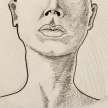
“Who do you think you are? Don’t you know who I am?”
Full of contempt, with the corners of his mouth pulled down, eyebrows raised, and chest puffed, my father played the grandiose. Hardly intimidated, the bearlike psychiatric nurse put his muscular arm and broad paw on my father’s cramped shoulder and helped him into the ambulance. Before the nurse could close the door, my father stretched out his muddy hands toward me. “Take good care of it! The CIA will find the truth! This is the evidence to save our future.” Then, with narrow, reddened eyes drowning in desperation, he placed a dirty finger over his lips and looked around. “Not a word. It’s about life and death!”
Tears ran down my cheeks as I held the earth-encrusted metal box pressed to my chest. I hated it. Every time my father ended up like this, I felt his humiliation and degradation.
Today, September 15th, he would spend his birthday alone in a mental hospital. They would strap his limbs to a bed and turn him into a vegetable with powerful sedatives. His eyes, holding nothing, would be glued to the ceiling in a dead gaze while his tongue would hang out of his gaping mouth.
The sonorous voice of the huge psychiatric nurse sounded like sunshine. I pulled myself together. “Don’t worry, in twenty minutes the injection will work and he’ll sleep in peace. Soon he’ll feel much better. Tomorrow after 11 a.m. you can visit him in the closed men’s ward. He’ll be glad to see you. At noon, when the doctor’s round is over, you can meet Dr. Grossmuth. He’ll discuss everything else with you.”
His hefty, businesslike handshake was meant to give me courage. Then the ambulance raced off with a blue light and a howling siren.
I turned to my father’s “site of operation,” the garden of the grand old villa of the mayor of Wannsee, a Berlin suburb. Mounds of earth were thrown up all over the place, the once manicured lawn now full of ditches.
On this cool September morning, the mayor of Wannsee and his family, disturbed and shivering, stood next to a police officer taking down their statements. Unable to comprehend the inexplicable upheaval, the major expected explanations from me. He hoped the neighbors hadn’t noticed the madman who had broken into his garden at 5:30 a.m. and ravaged it.
I first turned to the officer, “Is there anything else you need?” Officiously, I took a clipboard and pen out of my purse as if I was part of the usual procedure. Since my father was already on file, the police called a contact person. In case of my father that was me, because my other family shirked him. Supposedly psychotic perpetrators caused fewer problems when a family member was present. Yet all those times I took part in the arrests, my presence served rather to soothe administrators vexed by my father’s disruptions than to temper my father’s tempests.
He studied his report with furrowed eyebrows. “Let’s see, Ms. de Chatille. Well ... everything seems in order.” Then he read the incident report aloud, not mentioning the metal box my father had pushed into my hand before they handcuffed him. After he had ended with the sentence, “The perpetrator is already on record with the authorities and classified as a threat,” I nodded just as pompous as he with a severe face. When dealing with the German authorities, it is exceedingly important to appear serious at every opportunity. They judge you on it and the one with the deadliest serious face wins.
After the police officer said goodbye, I turned to the victim and his angry-looking wife. “My father,” I explained, “has schizo-affective psychosis. He’s hallucinating and believes he’s being persecuted by the CIA. I have no clue why he chose your garden for digging—but I’m terribly sorry.”
The indignant mayor’s wife addressed the crucial point of the matter. “And who,” she asked sharply, “who will now compensate us for the damage your father has caused? Our beautiful garden!”
I shook my head. “My father is dirt poor; my mother divorced him. There is no one to pursue for amends except me and my siblings, but they are still minors. I’m already 21, and I’m studying, but I don’t have any money, either. But I could come this afternoon and fill in the holes and trenches. If you sow a few handfuls of grass seeds, you won’t see anything in a few weeks.”
“But my roses!”
The mayor placed a soothing hand on his wife’s clenched fist. “My wife and I are sorry your father is sick and that you are so burdened as a young person. We hope he will be better soon.”
“I have a lot of experience fixing damaged property,” I said. “I’d be happy to help fix it all up.”
“No, that is unnecessary. We’ll let the gardener fix it. He’ll plant something pretty.” The mayor turned to his wife. “You’ll love it.” She bit her lip.
I said goodbye with repeated apologies for my father’s offense.
#
The next day, just after 11 in the morning, I arrived at the ivy-covered clinic for psychiatry at Bonhoefferweg 3 in Berlin Mitte. They had moved my father from the admission ward to the closed men’s ward, of which he was quite familiar. I recognized Amanuel, the friendly Ethiopian nurse. He gave me a warm wave and pointed down the aisle.
My father occupied the same room, one of the few single rooms in the ward. This had proven necessary during his last visit. Little did the staff yet know how manipulative and scheming my father was. For him to build social connections, they had placed him in a shared room and requested he take part in group activities. My father took this as a major offense. With his outrageous talent for the hidden weaknesses of others, he degraded, laughed at, insulted and hurt his fellow patients, nurses and doctors alike. While somehow deflecting the group from himself, this mean-spirited man moved the ward towards chaos. Soon the more aggressive and violent patients jumped on each other, and smashed furniture into the walls. The poor empathic and hypersensitive patients imbibed my father’s nasty aura and started hurting themselves. Once his surroundings exploded, my father, pleased with himself, became serene like a slumbering baby.
The memory of the locked-down ward with increased security staff because of my father flexing his crazy muscles still impressed me. When Dr. Grossmuth had told me about his misconduct and noticed my grin, he had asked me in astonishment. “Are you proud of your father’s shenanigans?”
I shrugged. “What else should I be proud of with such a father? My father doesn’t do half-assed stuff. At least he shows commitment!” That amused him.
My father didn’t call me into his room, so I just opened the door. He was curled up in a chair with his back to the door, face to the wall.
“Hello, Dad,” I said, stepping next to him. I almost didn’t recognize his dissolved face. Devoid of all tension, its flesh seemed to dangle off his skull. His jaw was hanging down just like his head, as if he no longer had any command over his body.
I never knew if he recognized me in this state, but hoped his subconscious would somehow register I cared. “Ouch,” I said. “Did they give you Haldol?” My voice sounded optimistic, but my insides coiled.
Haldol terrified my father. If threatened with it, he became docile. That shocked me. Nothing had ever intimidated him before. I’ve seen him getting into a brawl over nothing with five men bigger than him and starting a screaming fight with a presiding judge at his own trial.
“Haldol is hell,” he whispered once to me. His horrified tone triggered an icy coldness in my heart.
I pulled the second chair over, took his hand, a dead, cold schnitzel, in mine and tried to warm it up. “Dad,” I said. “What should I do with the tin box?”
He didn’t move, but I felt a slight grasp in his hand. I stroked it. “Don’t worry, Dad. I’ll keep everything for you. I won’t tell anyone. You can count on me.” He tried to lift his head, but then let it fall again, as if the effort was just too immense.
Amanuel stuck his head in the door. “Hello, Ms. de Chatille, the doctor can see you now.”
I whispered into my father’s ear, “Don’t worry. I’ll come back after I finished with Dr. Grossmuth.”
In the consulting room, the senior physician in charge greeted me like an old acquaintance, calling me “dear colleague”—maybe because he knew of me being a junior undergraduate in psychology.
I learned my father had dug up the entire garden in three hours with nothing but both his hands. “I don’t know how he even physically managed that,” said Dr. Grossmuth, shaking his head. “Why will remain a mystery, because your father does not want to comment.”
According to the files, they could still regard my father as a patient endangering himself- and others, which would allow the clinic to keep him for three to six months even against his consent. I nodded in relief. As a lawyer, my father was savvy about his rights and had managed many times to reach his release promptly after 48 hours of holding time.
This time, he would at least receive long-term therapy. If not healing, I was hoping for his mental stability and actual life prospects. The doctor handed me his report and a bunch of applications that I would have to fill out.
When I return to my father’s room, he is still sitting there. I sit down next to him and grab the tin can out of my purse. It’s rusty and difficult to open. I tinker around. He becomes restless even though he is not moving.
The box contains a bundle of letters, a small black notebook, and a velvet pouch filled with gleaming 1967 Krugerrands. This is my year of birth. Those old gold pieces must be worth at least $20,000.
I open the notebook. The pages are filled with elegant, faded writing in Sütterlin font, perfect like an engraver. I know this handwriting very well. This little black notebook contains my grandmother’s entries from 1939 to 1946, the year my grandfather was released as a POW and my father was born. Entered at the front page is the address at Wannsee, my father’s digging site. The letters are addressed to my grandmother and dated from 1939. The last letter’s date is my father’s birthday—September 15, 1946—and it is signed “Loving you forever from all my heart, Fritz.”
Fritz is not my grandfather’s name.
I stare at my father. He tries to lift his head, but he can’t. His head just sways from side to side. When I bring my face next to his, I see saliva running from his mouth, and his eyes are overflowing with tears.
“Daddy,” I said, aching. “Dear Daddy, please don’t cry.”
“Truuutthh,” he mumbles. I barely understand him. “Kruuuugggerrrand for you ... education.”
On his birthday, my father had dug up his past to care for my future.
I reach for his hand again. He squeezes it gently.






Comments
There are no comments for this story
Be the first to respond and start the conversation.